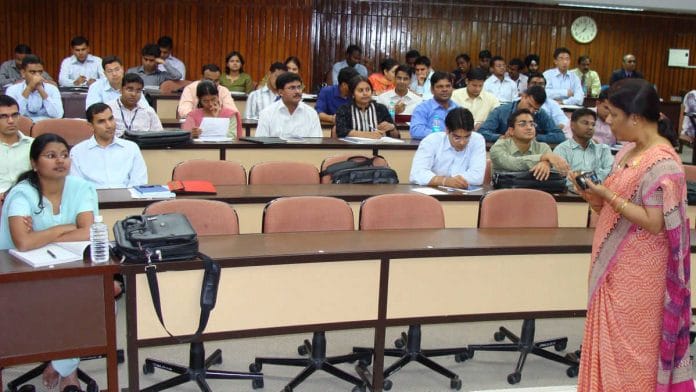New Delhi: The Lal Bahadur Shastri National Academy of Administration (LBSNAA) in Mussoorie is being revamped to accommodate probationers from all the 20-plus civil services in the country from 2020 onwards.
Senior officials from the Department of Personnel and Training (DoPT) said new hostels and an auditorium are being built at the 60-year-old academy in order to hold a common foundation course from next year.
At present, the academy has six hostels.
In 2019, for the first time in several decades, the academy conducted a common foundation course titled ‘Aarambh’ for civil service trainees.
However, some of the probationers were sent to Dr Marri Channa Reddy Human Resource Development (MCRHRD) Institute in Hyderabad as logistical arrangements for the combined training of all officers at the academy could not be made at such short notice.
The decision on a unified foundation course was taken by the government just a few months before.
“This course, Aarambh, is nation-centric and future-centric… It will usher in a paradigm shift in administration, whereby people stop working in silos,” PM Modi said a few weeks ago, addressing over 420 civil service probationers in Kevadia, Gujarat. “Instead, people work together and in a comprehensive manner.”
While trainees of the 2019 batch were trained in Mussoorie and Hyderabad, they had all assembled at the Statue of Unity in Kevadia for a three-day event called “Aarambh” to honour Sardar Vallabhbhai Patel on his birth anniversary, 31 October.
Also Read: In IAS training academy, women civil servants are seen by male colleagues as husband-hunters
A status symbol
When the academy in Mussoorie was just set up, all probationers underwent a common foundation course. However, as recruitment across services swelled up, the academy could not accommodate trainees from all the services, a DoPT official said.
Over the years, what started as a logistical arrangement became a status symbol of sorts as LBSNAA came to be perceived as an exclusive preserve of the IAS.
The Modi government has restarted the common foundation course with the aim of encouraging inter-service bonhomie and doing away with the hierarchy between different civil services.
“It is very important to have networks and friendships across services since that only helps in better governance and administration…” the official quoted above said. “Over the years, that got diluted due to logistical reasons.”
In order to emphasise the importance of the common foundation course, the government decided in July that 10 per cent weightage in service selection will be given to the performance of selected candidates in the mandatory combined foundation course.
Also Read: Inside India’s giant IAS coaching factories: Hope, hype and big money







This is misinformation. Combined foundation course is still being held. It was discontinued only for a couple of years as the Savoy hotel lease expired. The report seems to suggest that combined foundation was an innovation probably by Mr Modi. Undoubtedly combined foundation is invaluable as some of the inter-service camaraderie survives, easing the task of getting official work done.
Combined training would work only if the functions of the different services were the same. As it stands, services like IAAS, railway services, Information service, defence estate service by the very nature of their work have nothing to do with day to day administration or public dealing. These are technical services and while a case can be made to give them promotions at the same rate as IAS, they will perform best if technical training is given in their own institutes. It’s simple, technical services do operate in silos because their job requires them to do so. The IAS, IPS and IFS are involved in public dealing and formulation of general public policy right from their first posting. This is why they are premier services.
The 10% weightage of the foundation course in service allocation will bring in neptism, favouritism and corruption. The UPSC exam has had an unblemished record of complete integrity. This must be maintained. Otherwise, candidates with political, administrative or judicial influence will ask their patrons to make calls to the training academy. This will bring the UPSC system down to that of state public service commissions which are rife with allegations of all sort.
If marks from the foundation course are a metric in service allocation, there would be competition and instead of camaraderie the candidates would develop rivalry.
Along with the hardware, the software is equally important. Each young mandarin should imbibe the spirit of the Constitution, its respect for pluralism and diversity, its compassion for most Indians who are poor.
Young mandarins are ambitious people. They will look at the constitution the way their political masters will look at it.
Very true. That is exactly what is happening. Which is why all these reforms, including lateral entry, leave one cold.
Last seventy years were no different. Why blame Modi then?